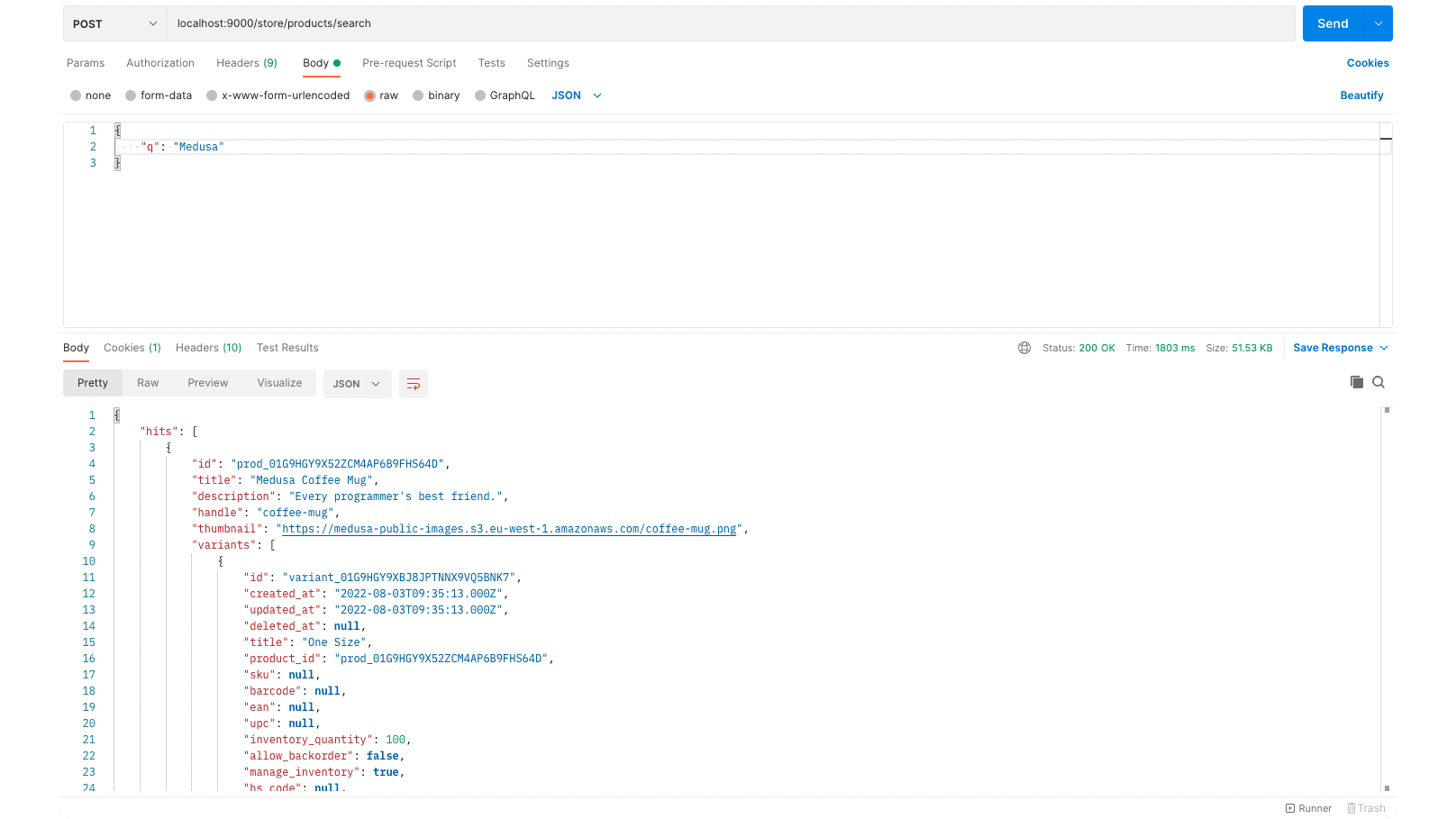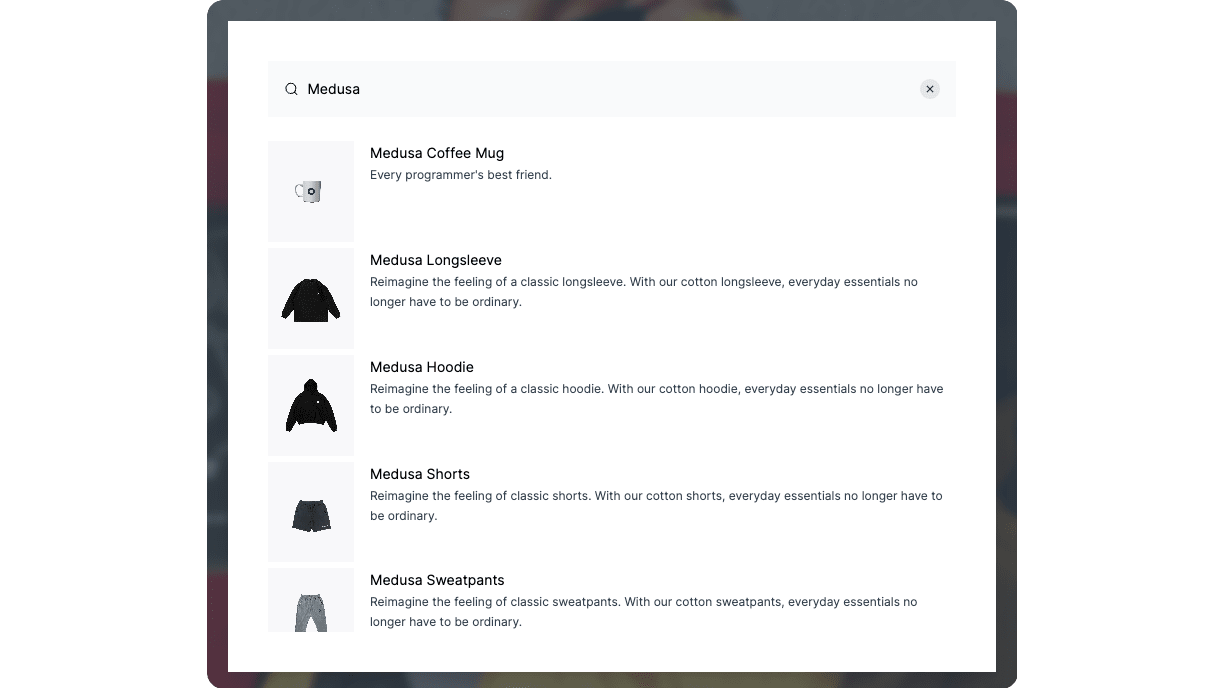Algolia
In this document, you’ll learn how to install the Algolia plugin and use it on both your Medusa backend and your storefront.
Overview
Algolia is a search engine service that allows developers to integrate advanced search functionalities into their websites including typo tolerance, recommended results, and quick responses.
Algolia can be used for a wide range of use cases, including ecommerce websites. By integrating Algolia into your ecommerce website, you can provide your customers with a better user experience and help them find what they’re looking for swifltly.
Through Medusa's flexible plugin system, it is possible to add a search engine to your Medusa backend and storefront using Algolia with just a few steps.
Prerequisites
Medusa Components
It is required to have a Medusa backend installed before starting with this documentation. If not, please follow along with the quickstart guide to get started in minutes. The Medusa backend must also have an event bus module installed, which is available when using the default Medusa backend starter.
Algolia Account
You need to create an Algolia account before you follow this documentation. Algolia offers a free plan to get started quickly.
Create an Algolia App
The first step is to create an Algolia app for your Medusa backend. To create one, open the Applications page or, on your dashboard, go to Settings then choose Applications.
On the Applications page, click on the New application button at the top right.

In the new page that opens, optionally enter a name for the application and choose a subscription plan. You can choose the Free plan for now, but it’s recommended to switch to the Pay-as-you-go plan as your business grows.

Once you’re done, click on the Next Step button. If you picked Pay as you go service, you’ll need to enter billing details before you proceed.
Then, you’ll be asked to pick a region for your application. Once you’re done, click on Review Application Details.

In the last step, you’ll see a summary of your order. If all looks good, check the checkboxes at the end of the form to indicate that you agree to the terms and conditions. Then, click on the Create Application button.

Retrieve API Keys
To retrieve the API keys that you’ll use in the next sections, go to Settings, then choose API Keys in the Team and Access section.

On this page, you’ll find the Application ID, Search-Only API Key, and Admin API Key. You’ll need the Application ID and Admin API Key for the Medusa backend. As for the storefront, you’ll need the Application ID and Search-Only API Key.
If you have more than one application in your Algolia account, make sure you’re viewing the keys of the correct application by checking the Application dropdown at the top left.

Install the Algolia Plugin
In the directory of your Medusa backend, run the following command to install the Algolia plugin:
Then, add the following environment variables to your Medusa backend:
Where <YOUR_APP_ID> and <YOUR_ADMIN_API_KEY> are respectively the Application ID and Admin API Key found on the API Keys page.
Finally, in medusa-config.js add the following item into the plugins array:
Index Settings
Under the settings key of the plugin's options, you can add settings specific to each index. The settings are of the following format:
Where:
indexName: the name of the index to create in Algolia. For example,products. Its value is an object containing the following properties:indexSettings: an object that includes the following properties:searchableAttributes: an array of strings indicating the attributes in the product entity that can be searched.attributesToRetrieve: an array of strings indicating the attributes in the product entity that should be retrieved in the search results.
transformer: an optional function that accepts a product as a parameter and returns an object to be indexed. This allows you to have more control over what you're indexing. For example, you can add details related to variants or custom relations, or you can filter out certain products.
Using this index settings structure, you can add more than one index.
These settings are just examples of what you can pass to the Algolia provider. If you need to pass more settings to the Algolia SDK you can pass it inside indexSettings.
Here's an example of the settings you can use:
const plugins = [
// ...
{
resolve: `medusa-plugin-algolia`,
options: {
// other options...
settings: {
products: {
indexSettings: {
searchableAttributes: ["title", "description"],
attributesToRetrieve: [
"id",
"title",
"description",
"handle",
"thumbnail",
"variants",
"variant_sku",
"options",
"collection_title",
"collection_handle",
"images",
],
},
transformer: (product) => ({
id: product.id,
// other attributes...
}),
},
},
},
},
]
Test the Algolia Plugin
Run your Medusa backend with the following command:
The quickest way to test that the integration is working is by sending a POST request to /store/products/search. This endpoint accepts a q body parameter of the query to search for and returns in the result the products that match this query.

You can also check that the products are properly indexed by opening your Algolia dashboard and choosing Search from the left sidebar. You’ll find your products that are on your Medusa backend added there.
If you have more than one application on your Algolia account, make sure you’re viewing the keys of the correct one by checking the Application dropdown at the top left.

Add or Update Products
If you add or update products on your Medusa backend, the addition or update will be reflected in the Algolia indices.
This feature is only available if you have an event module installed in your Medusa backend, as explained in the Prerequisites section.
Add Search to your Storefront
In this section, you’ll learn how to add the UI on your storefront to allow searching with Algolia. This section has instructions for Medusa’s Next.js Starter Template as well as React-based frameworks.
Storefront Prerequisites
It is assumed you already have a storefront set up and working with the Medusa backend, as this section only covers how to add the search UI.
If you don’t have a storefront set up, you can use the Next.js Starter Template that Medusa provides.
Add to Next.js Starter Template
The Next.js Starter Template has the Algolia integration available out of the box. To get it working, you just need to follow three steps.
First, ensure that the search feature is enabled in store.config.json:
Then, add the necessary environment variables:
Where <YOUR_APP_ID> and <YOUR_SEARCH_API_KEY> are respectively the Application ID and Search-Only API Key on the API Keys page.
Finally, change the code in src/lib/search-client.ts to the following:
import algoliasearch from "algoliasearch/lite"
const appId = process.env.NEXT_PUBLIC_SEARCH_APP_ID || ""
const apiKey =
process.env.NEXT_PUBLIC_SEARCH_API_KEY || "test_key"
export const searchClient = algoliasearch(appId, apiKey)
export const SEARCH_INDEX_NAME =
process.env.NEXT_PUBLIC_INDEX_NAME || "products"
If you run your Next.js Starter Template now while the Medusa backend is running, the search functionality will be available in your storefront.
To make sure the Next.js Starter Template properly displays the products in the search result, include in the attributesToRetrieve setting of the Algolia plugin on the Medusa backend at least the fields title, handle, description, and thumbnail.

Add to Other Storefronts
To integrate Algolia's search functionalities in your storefront, please refer to Algolia's InstantSearch.js documentation. You'll find packages for different frontend frameworks and how you can use them.